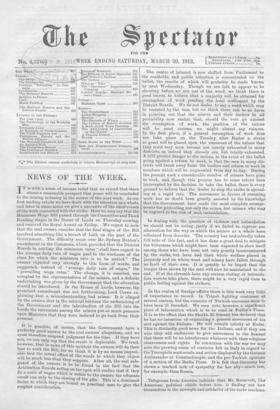NEWS OF THE WEEK.
IT is with a sense of intense relief that we record that there seems a reasonable prospect that peace will be concluded in the mining industry in the course of the next week. In our first leading article we have dealt with the situation as a whole, and later in these notes we give a narrative of the chief events of the week connected with the strike. Here we may say that the Minimum Wage Bill passed through the Committee and Third Reading stages in the House of Lords on Thursday evening. and received the Royal Assent on Friday. We regret to note that the coal owners consider that the final stages of the Bill involved something like a breach of faith on the part of the Government. The difficulty arose over Mr. Sydney Buxton's amendment in the Commons, which provided that the District Boards in settling the minimum rates "shall have regard to the average daily rate of wages paid to the workmen of the class for which the minimum rate is to be settled." The owners objected very strongly to this form of words, and suggested, instead of "average daily rate of wages," the "prevailing wage rates." The change, it is asserted, was accepted by the representatives of the miners, and a definite undertaking was given by the Government that the alteration should be introduced. In the House of Lords, however, the promised amendment was not forthcoming, Lord Crewe ex- plaining that a misunderstanding had arisen. It is alleged by the owners that in the interval between the undertaking of the Government and the introduction of the Bill into the Lords the extremists among the miners put so much pressure upon Ministers that they were induced to go back from their promise.






































